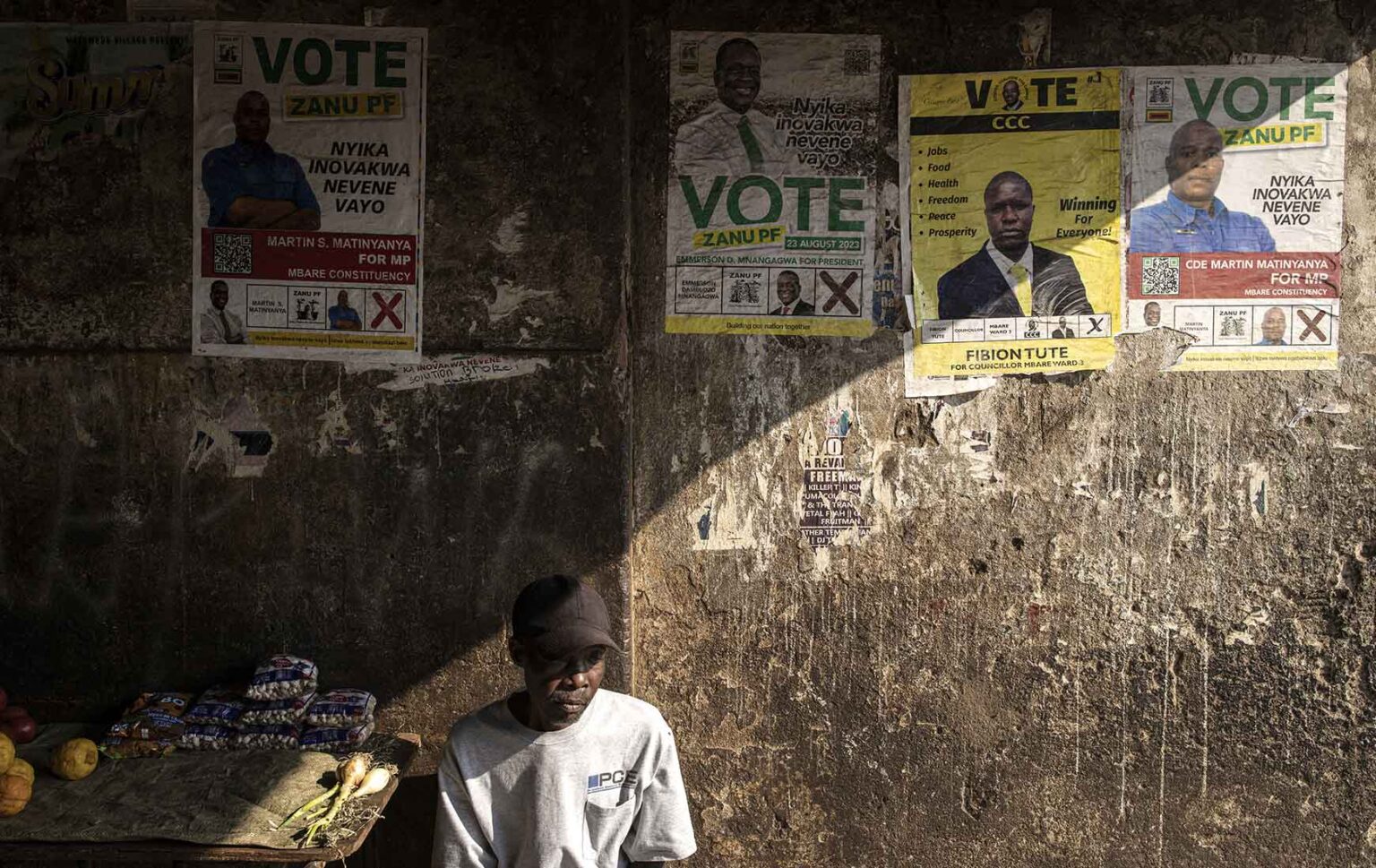Zimbabwe has faced complex tensions between traditional leadership and multiparty governance. Traditional leaders, such as chiefs, have been accused of playing partisan roles in elections and favouring specific political parties. These accusations have raised concerns about the neutrality of traditional leaders in the democratic process.
Zimbabwe’s Constitution and the 1988 Traditional Leaders Act define the role of traditional leaders. Their role includes promoting and upholding the cultural values of their communities, facilitating development and administering communal lands, protecting the environment, resolving disputes in their communities, and exercising any other functions conferred or imposed on them by an act of Parliament.
Zimbabwe’s constitutional and institutional frameworks make sufficient provisions that prohibit traditional leaders from partaking in elections and electoral processes to advance the interests of any political party or candidate.
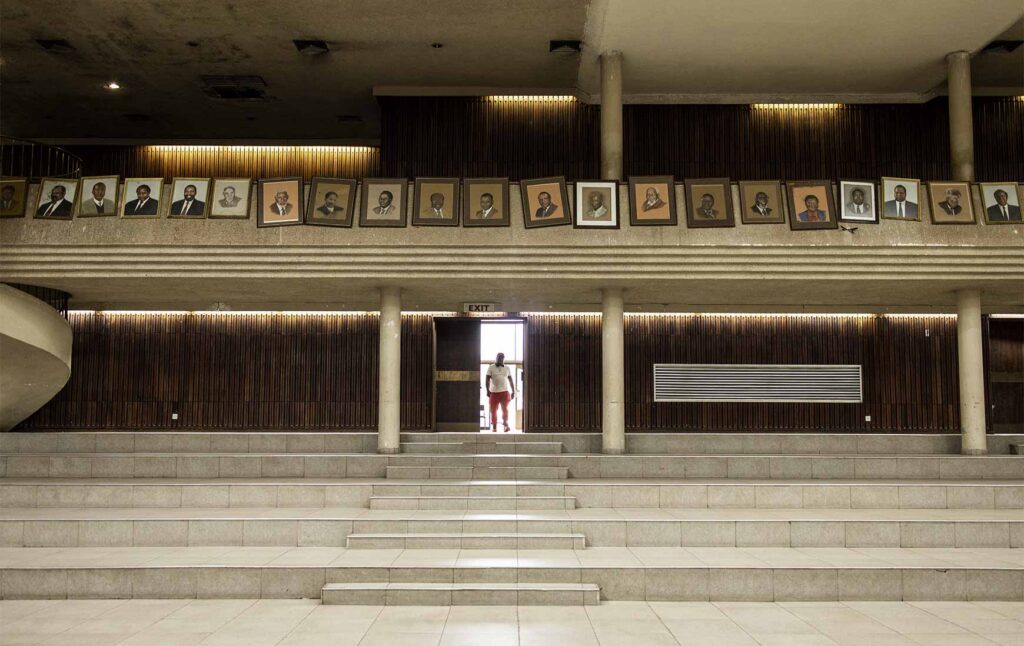
What is problematic is enforcement, because the political elite who are supposed to ensure enforcement are beneficiaries of the status quo. On the other hand, traditional leaders are willing collaborators because they benefit from political patronage.
In Zimbabwe, as elsewhere in Africa, traditional leaders have always commanded profound respect among rural communities, where they preside over everything from the resolution of disputes to the sharing of resources. Chiefs and headmen are still revered within some political circles for having worked with nationalists and freedom fighters in the 1960s and 1970s during the bloody and protracted guerrilla war against Ian Smith’s white minority government.
However, critics and analysts say that with the emergence of a powerful opposition in 2000 in the form of the Movement for Democratic Change (MDC), traditional leaders have been blatantly threatened, bribed, politicised, and used by the ruling ZANU PF to rally villagers behind the party.
Traditional leaders receive a generous monthly government stipend as part of Zimbabwe President Emmerson Mnangagwa’s strategy to keep them on side. In the run-up to the August 23 general and presidential elections last year, they also received off-road vehicles doled out by the Mnangagwa government.
But bribery is not the only method of inducement Mnangagwa and his supporters use. In its regular pre-election monitoring updates before the August 23 poll, the Zimbabwe Election Support Network (ZESN) observed that chiefs who had given opposition party Citizens Coalition for Change (CCC) permission to hold campaign rallies in their locality had been harassed by state security agents, who threatened to withdraw government support if they continued to do so. The CCC is now the biggest opposition party in Zimbabwe, overshadowing the MDC-T, which is now a pale shadow of its former self.
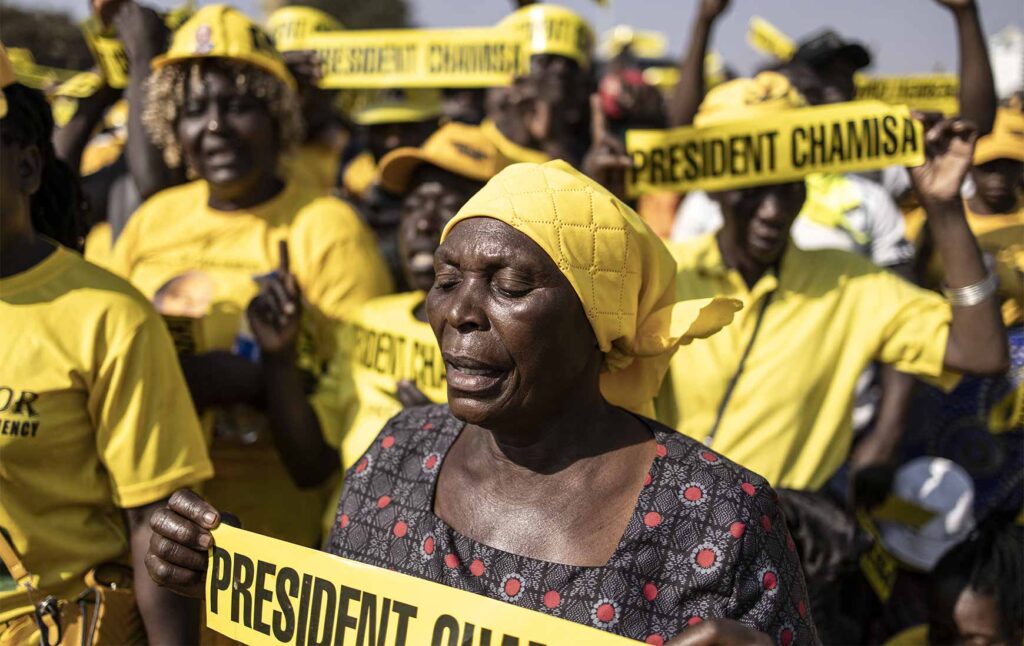
On May 16, 2018, Justice Garainesu Mawadze of the Masvingo High Court issued a judgement banning all traditional leaders from partisan politics. The National Chiefs Council (representing all 282 Chiefs in Zimbabwe) and its then President, Chief Fortune Charumbira, were prohibited from making political statements on their involvement or allegiance to ZANU PF on any public platform. Conducting campaigns on behalf of the ruling party by traditional leaders—chiefs, head persons, or village heads—was declared unconstitutional and a violation of the right not to be treated unfairly in a discriminatory manner based on political affiliation.
This has created the notion of a “competing principals dilemma” where the institution of traditional leaders, unable to resist its co-option, finds itself with a conflict of interest—having to simultaneously serve the interests of the political authority on the one hand and those of the people on the other.
In South Africa, for example, traditional leaders support the electoral process as a national programme that is not an end in and of itself but a means to a developmental end. They must make their areas of jurisdiction accessible to all aspirant parties and candidates.
The Zimbabwe Human Rights Commission (ZHRC) had no kind words for chiefs and the role they played in Zimbabwe’s August 2023 harmonised elections. In its post-election report released in November, the ZHRC pointed out glaring irregularities during the 2023 polls, including the involvement of affiliate organisations.
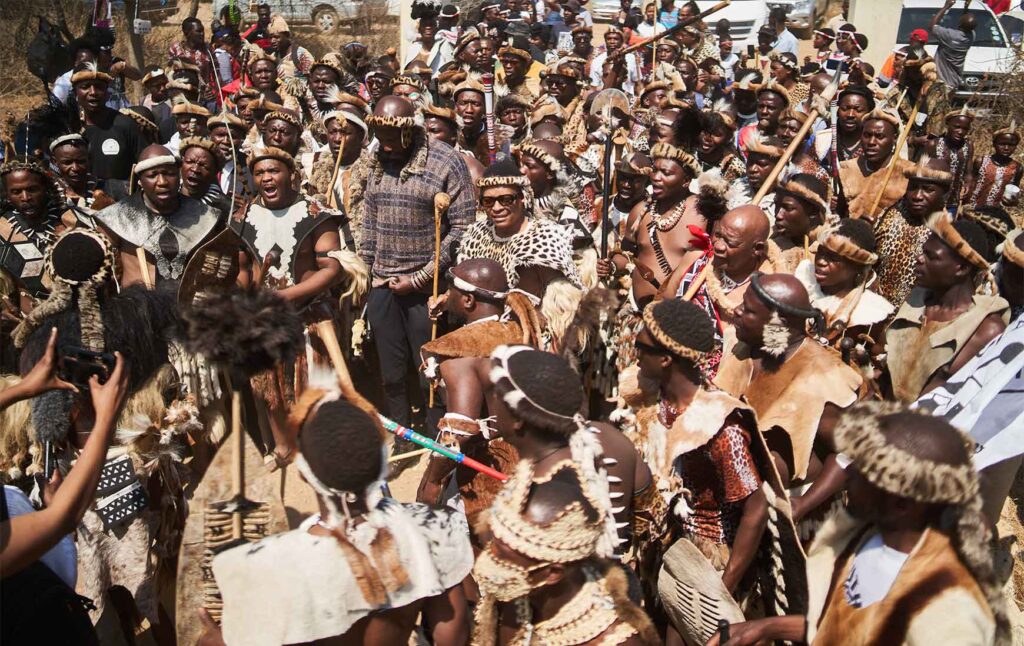
“Despite the peace and calm that prevailed during the election period, the watchdog received cases of violations of civil and political rights, including intimidation, coercion, and threats, among others,” the ZHRC said. “There were also allegations of intimidation, organised voting, the conflation of roles by some traditional leaders who doubled up as political agents, and the practice of conducting exit poll surveys, which might have compromised the secrecy of the ballot.”
But the former Deputy Minister of Information, Publicity and Broadcasting and ZANU PF provincial chairman, Kindness Paradza, begged to differ. He defended the role of chiefs in elections and electoral processes.
“Chiefs are part of the establishment,” Paradza told Africa in Fact. “Also, chiefs were at the forefront of the liberation struggle, so one cannot separate them from the revolution party, ZANU PF. Those that deviate were born after independence in 1980 and are not so well-versed in our liberation war history.”
The Zimbabwe Elections Support Network (ZESN), in a position paper on elections, says the role of traditional leaders in elections and electoral processes depicts a picture of a traditional authority whose existence is held in tension between the expectation of citizens that it be a neutral vanguard of traditions, customs, and community development on the one hand and the ruling elite’s demands for it to be loyal and serve the interests of the incumbent party.
But despite this, and notwithstanding the political polarisation prevailing in Zimbabwe, there is a consensus on the institution of traditional leaders regarding its development role at the local government level.
According to Gabriel Masvora, the Director of Communications and Advocacy in the Ministry of Local Government and Public Works, traditional leaders have a central role to play in liaising with government departments to champion growth in their areas.
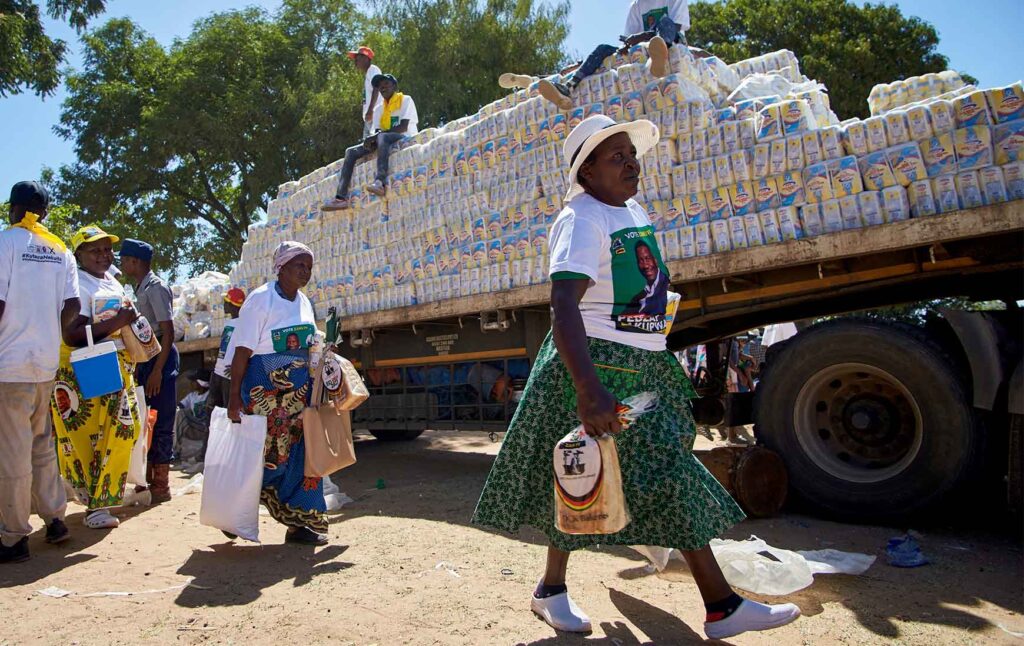
“Traditional leaders, in their institutional framework, chair village, wards, and chiefs council meetings, are mandated to produce local economic plans,” he told Africa in Fact. “The bottom-up process. In the same vein, central government, which administers devolution funds, for example, is then supposed to use the money to target projects that are identified in local economic plans.”
Masvora was adamant that chiefs were not political animals: “Section 282 of the Constitution clearly states the roles of the traditional leaders and, in particular, that they are not supposed to be involved in active politics.
“The accusation that chiefs favour one political party over others stems from those people who confuse the roles of chiefs,” Masvora said. “Chiefs are part of the country’s governing system and are supposed to help in implementing government projects. In Zimbabwe, the ruling party is superior to the government and gives direction to policies that are used by the government.
“The confusion [happens] when chiefs implement government programmes, some of which would have been directed by the ruling party. Some people confuse this as being partisan and biassed,” Masvora said.
Rashid Mahiya, the executive director of the civic organisation Heal Zimbabwe, said traditional leaders, if left to discharge their duties independently, could be effective mediators and adjudicators in their communities, able to spearhead positive traditional forms of conflict resolution and intervention on behalf of victims of injustice.
“In light of this, traditional leaders meddling in politics greatly compromises this important role that helps to build peaceful communities and social cohesion within them,” Mahiya told Africa in Fact.
The blurred lines in traditional leaders’ interference in elections and electoral processes, despite the constitution and subsidiary laws prohibiting it, are to be found in the historical relationship between traditional leaders and the political elite during the colonial period as well as in the post-independence era. The colonial powers manipulated traditional institutions and, using an indirect rule system, interfered with traditional institutions, rewarding obedience while also punishing dissent.
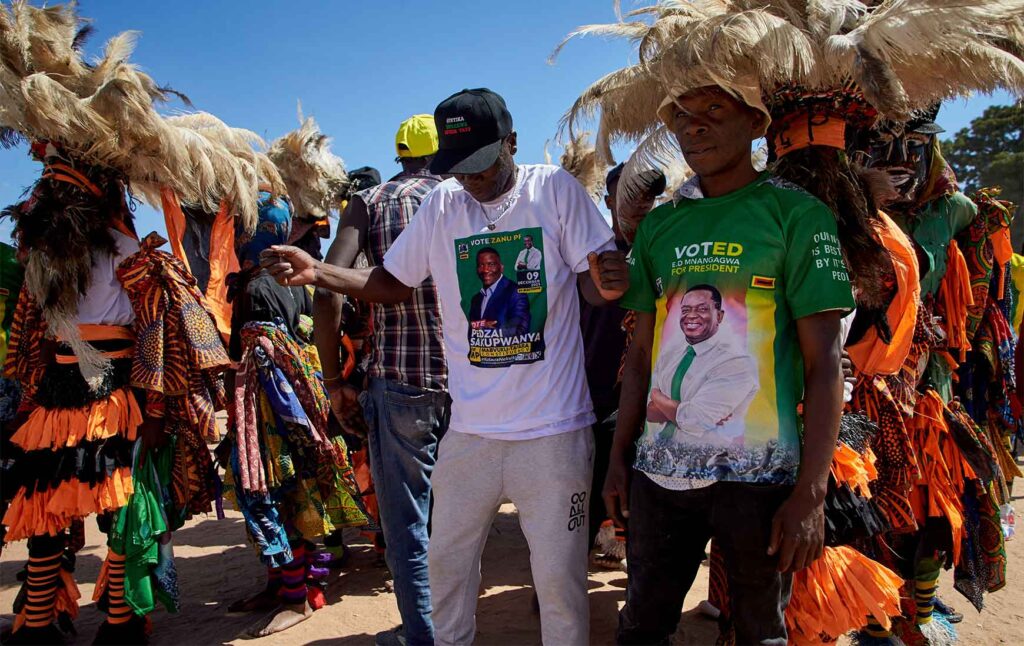
In Zimbabwe, as in the colonial period, dissent has been punished, which has compelled traditional leaders to toe the line. As a result, there is a perception that the entire traditional institution is pro-the ruling party.
A good example is Ntabazinduna Chief Nhlanhla Ndiweni, who was accused of overstepping his jurisdiction as a traditional leader. Chief Ndiweni found himself in the eye of a storm four years ago when he called on Western countries to impose sanctions on government leaders if they went ahead and repossessed a piece of land in his area in Ntabazinduna, which was occupied by a white commercial farmer.
The firebrand chief, a close friend of opposition CCC President Nelson Chamisa, also said he did not recognise President Mnangagwa’s government. He was subsequently stripped of his chieftainship and charged and sentenced to 24 months in prison for malicious damage to property after he was accused of destroying property belonging to a villager who had resisted an order to leave his area. Ndiweni skipped the country and is currently living in exile in the United Kingdom.
Heal Zimbabwe’s Mahiya said the realignment of the traditional Leaders Act to the Constitution was necessary and called for the creation of an Integrity and Ethics Committee of Chiefs as espoused in Section 287 of the Constitution. The committee would then exercise the following functions: develop and enforce integrity and ethical conduct on the part of traditional leaders, resolve disputes between traditional leaders, and deal with complaints against traditional leaders.
Mahiya also appealed to traditional leaders to respect the Constitution and reassure citizens that they were non-partisan, performing their duties and responsibilities in a professional and non-partisan manner that allowed all citizens, regardless of political affiliation, equal access to resources and guaranteed non-discrimination on a partisan basis.
The ZESN position paper, meanwhile, called on traditional leaders not to accept any directive that demands they unduly influence citizens under their jurisdiction when exercising their constitutional right to elect leaders of their choice. Zimbabwe’s parliament, the ZESN said, must ensure that all citizens enjoy fundamental freedoms and human rights, including freedom of association, assembly, and expression, in line with the SADC Principles Guiding Democratic Elections.
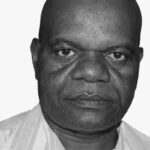
Barnabas Thondhlana has worked for Dow Jones and Bloomberg newswires as their Zimbabwe correspondent. He is the publisher of three community newspapers and a national daily, and a media trainer in investigative journalism. He has been instrumental in the formation of several independent newspapers, including the Zimbabwe Independent, The Daily News, The Daily News on Sunday, Newsday and The Observer.

